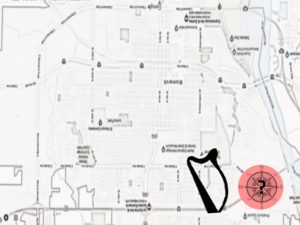If goal setting is so last year and this year we are going to do better – what are we going to do? How will we know if we got where we meant to?
First, we’re going to acknowledge that this is where that maxim about life being a journey not a destination kicks in. And to that end, I’d suggest that this year – we bimble.
To bimble is to walk about aimlessly but not pointlessly, to get nowhere in particular, while enjoying the walk.
In other words – there is no “there” to get to. The time is spent enjoying the time.
 Seem like a good idea? For so many who play for enjoyment, this is the ideal approach to the work of playing throughout the year. No deadlines, no stress, simply playing to play…and to enjoy! No goal setting. No getting to December and feeling like you have failed after working so hard!
Seem like a good idea? For so many who play for enjoyment, this is the ideal approach to the work of playing throughout the year. No deadlines, no stress, simply playing to play…and to enjoy! No goal setting. No getting to December and feeling like you have failed after working so hard!
But even if we play to enjoy, we would like to improve, to see some progress. How will we do that without setting goals? We’ll bimble – enjoying our music and our lessons – without being fussed about how fast we are (or are not) progressing or that we are not ready to perform well enough.
To make improvements, we can focus on what we’re doing. Change the focus from “where am I trying to get by some specific time” to instead be “what am I doing just now – can I do it just a little better right now?” We can focus on practicing or learning. We can spend time reading, listening, analyzing music, thinking about the tunes.
This enjoying the journey means that we don’t have to “work” so hard that we forget what we enjoyed about playing in the first place. It means we can pay attention to the little things –
- how our hands feel as they close
- how the harp vibrates on our shoulder or thigh
- how the bass wires tickle our feet when we don’t wear shoes
- how we particularly enjoy the sound of those specific strings that made us buy that harp in the first place
- how buzzes sound terrible but are kind of fun to make!
Take time to enjoy the various parts of your practice time – the simple yet difficult task of performing scales, arpeggios, or other exercises. The delight in getting through a tune you’ve been working to learn. The fun but determined way you have to work new music into your head. This focus and enjoyment is a motivation to get back on the bench, to spend the time, to play the harp, to practice.
We can bimble on our instruments – play and enjoy – aimlessly but not pointlessly.
And pay attention.
Pay attention to how you have an easier time now with some particular technique. Do your hands close fully now, without you having to think, “fingers all the way to the palm” each time? Do you move your elbows as needed to address the strings at a good and ergonomic angle? Can you sit comfortably for long enough to satisfy yourself?
Notice that you are more able, with each passing practice, to play more easily. Do you remember more of each phrase without having to read every note? Are you able to control your dynamics?
Use tools to capture your thoughts (recording, journaling, etc.). Are you able to note that you played straight through for the first time? Did your approach to working a tricky section work?
In the end, as we enjoy the time, we get where we end up – probably right where we wanted to be. Because really, there is no “there” there. There is only our time and our enjoyment at the harp. What are the things you want to notice while you’re at your harp?